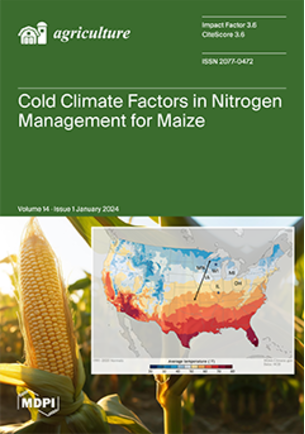Enhanced Food-Production Efficiencies through Integrated Farming Systems in the Hau Giang Province in the Mekong Delta, Vietnam
Q2 Agricultural and Biological Sciences
引用次数: 0
Abstract
This study compares the food-production efficiencies of integrated rice-fish farming and rice monoculture and evaluates how these farming systems contribute to sustainable food production in the Mekong Delta. The study explores how food-production efficiencies are influenced by the systems’ ecological connectivity by comparing more integrated systems that apply integrated rice-fish farming and integrated pest management (IPM) with less integrated systems farming only rice. Rice-fish farmers with plenty of fish had significantly higher rice yields than farmers with less or no fish, especially during the second crop when the rice was grown together with the fish. A positive correlation between the fish and rice yields, indicated synergistic effects between the fish and rice, due to strengthened ecological connectivity and trophic interactions within the rice-field ecosystem. Overall, rice-fish farmers had higher rice yields than rice farmers, despite using lower amounts of fertilizers and pesticides. They also had lower rice production costs compared to rice farmers, partly because the fish helped fertilize the rice and control rice pests. They had a significantly higher profit and benefit cost ratio than rice farmers because of lower production costs, and high rice and fish yields. The results indicate that food-production efficiencies in the Mekong Delta can be enhanced through diversification and increased ecological connectivity, leading to a more efficient use of rice field ecosystem services that support a long-term and healthy production of food.越南湄公河三角洲后江省通过综合农业系统提高粮食生产效率
本研究比较了稻鱼综合种养和水稻单一种植的粮食生产效率,并评估了这些耕作制度如何促进湄公河三角洲的可持续粮食生产。通过比较稻鱼综合种养和病虫害综合防治(IPM)的综合种养系统与仅种植水稻的综合种养系统,本研究探讨了粮食生产效率如何受到系统生态连通性的影响。养鱼多的稻田养鱼户的水稻产量明显高于养鱼少或不养鱼的农户,尤其是在水稻与鱼一起生长的第二季。鱼类产量与水稻产量之间的正相关性表明,鱼类与水稻之间存在协同效应,这是因为稻田生态系统中的生态连通性和营养相互作用得到了加强。总体而言,尽管稻田养鱼户使用的化肥和农药较少,但他们的水稻产量却高于水稻种植户。与稻农相比,他们的水稻生产成本也较低,部分原因是鱼帮助水稻施肥和控制水稻害虫。由于生产成本较低、水稻和鱼类产量较高,他们的利润和收益成本比明显高于稻农。结果表明,湄公河三角洲的粮食生产效率可通过多样化和增加生态连通性来提高,从而更有效地利用稻田生态系统服务,支持长期健康的粮食生产。
本文章由计算机程序翻译,如有差异,请以英文原文为准。
求助全文
约1分钟内获得全文
求助全文
来源期刊

Agriculture
Agricultural and Biological Sciences-Horticulture
CiteScore
1.90
自引率
0.00%
发文量
4
审稿时长
11 weeks
期刊介绍:
The Agriculture (Poľnohospodárstvo) is a peer-reviewed international journal that publishes mainly original research papers. The journal examines various aspects of research and is devoted to the publication of papers dealing with the following subjects: plant nutrition, protection, breeding, genetics and biotechnology, quality of plant products, grassland, mountain agriculture and environment, soil science and conservation, mechanization and economics of plant production and other spheres of plant science. Journal is published 4 times per year.
 求助内容:
求助内容: 应助结果提醒方式:
应助结果提醒方式:


